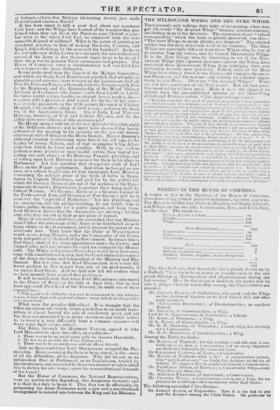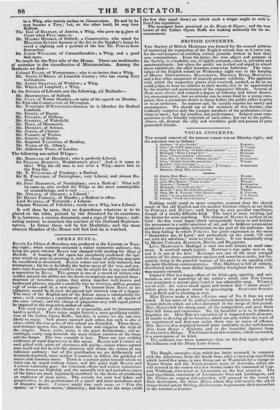PARTIES IN TI1E HOUSE OF COMMONS.
A TABLE or list of the Members of the Howe of Commons, clas,ed accerdieg to their political sentiments, has been sent to us. The House is divided into Radicals (English and Irish), Liberals, and Wines, on the one side; Conservative, Tory, awl tiera-Tory, on the other. The result k- 1(10
132 'total Mibisterialists 332
Conservatives r_41 'forks 1:.;9 I'ltra-"turies 100
;319
Ldscralo
Whigs Total The Speaker Stafford, suspended writ Evesktur, Renfrew, Anglesea, Bucks, litingarvats, vacant
The Sfaet/nett says, that thoueli the list is plainly diawn up by a Radical, " it seems to be as nearly as possible exact in the one grand division of Ainistetialists and Oppoehionists during the last session." Ibex far this praise is deserved, the reader will Le able to judge, when he learns that among the Conservatives are placed—
Mr. Eeweeo Bennet, of Staffordshire, who voted with the Whigs
on the election of Speaker, on Me Irish Church and other
pII ty questions.
Mr. ALEXANDER DENNISTOUN, of Dumbartonshire; an excellent "Radical.
Mr. DILLwTN, of Glannorganshire; a Whig.
Lord D. G. HALLYBERToN, ut ForforAire ; a Liberal.
Ale KNOX, of Dungarvan ; a Whig.
Sir L, PARE Y, of Carinavonshire ; a Whig. Mr. G. R. Romesos, of Worcester; a nondescript, but cestaiuly
not a Conservetive.
Mr. It. G. TOwNELEV, of Cambridgeshire; a Whig.
Among the Tories we find— Mr. BARING, of 'Thetford ; but this intelliger t and able man is cer- tainly no wcrse than it Conservative, mid on many important
questions is a Liberal in his views and votes.
Sir STRATeoun CANNING, of Lynn ; a Conservative. Mr. HA1;Dy, of Bmdford—what is be? A conscientious person, who " pays head-money," no doubt, but declaims on the sin of
In ibery. We suppose that he would eall himself a Conservative. Air. Fesnience Nolte'', of Hastings; a Conservative Whig—more Whig timn any thing else.
Mr. Alderman Tuomesue, of Sunielland; a Conservative.
Mr. CHARLES WyNN; a Conservative—surely not a 'fory, for we presume he would take otliee to-moirow under Earl GREY.
The following are called
Sir ANDREW AGNEw, of Wigtonsbire. Now it is too bad to put poor Sir ANDREw among the Ultra-Tories. He professes to be a Whig, who merely inclines to Conservatism. By and by he may become a Tory ; but, on the other hand, he may turn
Radical.
The Earl of BELFAST, of Antrim, a Whig, who gave up 1.,411ace at
Court when PEEL came in.
Mr. HUGHES HUGHES, of Oxford; a Conservative, who voted for MANNERS SUTTON because at the fire in the Speaker's house he saved a nightcap and a portrait of the late Mr. PURVIS from destruction.
Sir JAMES WILLIAMS, of Carmarthenshire; a Whig, and a good
deal more.
So much for the Tory side of the House. There are multitudes of mistakes in the classification of Ministerialists. Among the
Radicals we find—
Colonel EVANS, of Westminster ; who is no better than a Whig.
Mr. SMITH O'BRIEN, of Limerick County ; who has strong Tory inclinations.
Mr. JAMES GRATTAN, Of Wicklow; a Whig.
Mr. WHITE, of Longford ; a Whig.
In the division of Liberals are the following, all Radicals—
Mr. BROTHERTON, of Salford.
Mr. CLAY, of Tower Hamlets—in spite of his speech on Monday.
Sir EDWARD CODRINGTON, of Devonport. Mr. TI:NNYSON D'EINCOURT—because he is Member for Radical
Lambeth.
Mr. DIVETT, Of Exeter.
Mr. FIELDEN, of Oldham.
Mr. GASKELL, of Wakefield.
Mr. HALL, of Monmouth.
Mr. HINDLEY, Of Ashton.
Mr. JF.RVIS, of Chester.
Mr. PARROT, of Totnes.
Mr. STRUTT, of Derby.
Mr. Sergeant TALFOURD, of Reading.
Mr. WARD, of St. Alban's.
Mr. Alderman Woon, of London.
The following are called Whigs—.
Mr. BIDDULPH, of Hereford ; who is perfectly Liberal.
Sir FRANCIS BURDETT, Westminster's glory! And is it come to this ? Why, the old man is not even a Whig—move him to the Tory list.
Mr. T. DUNCOMBE, of Finsbury ; a Radical. Sir R. FERGUSON, of Nottingham ; very Liberal, and almost Ra- dical.
Sir JOHN HOBHOUSE, of Nottingham ; once a Radical ! What will he come to, who reviled the Whigs as the most contemptible
of created beings, and is now Mr. OSWALD, of Glasgow ; a Liberal.' Sir HENRY PARNELL, of Dundee ; a Radical in office.
Lord RUSSELL, of Tavistock ; a Liberal.
Captain Wesivss, of Fifeshire ; surely not a Whig, but a Liberal.
It will thus be seen, that no dependence whatever is to be placed on the table, praised by the Standard for its exactness. It is, however, a curious document, and a sign of the times ; indi- cating anxiety to ascertain the conduct of the National Represen- tatives. In future there will be few Doubtfuls; and the most obscure Member of the House will find that he is watched.



























 Previous page
Previous page